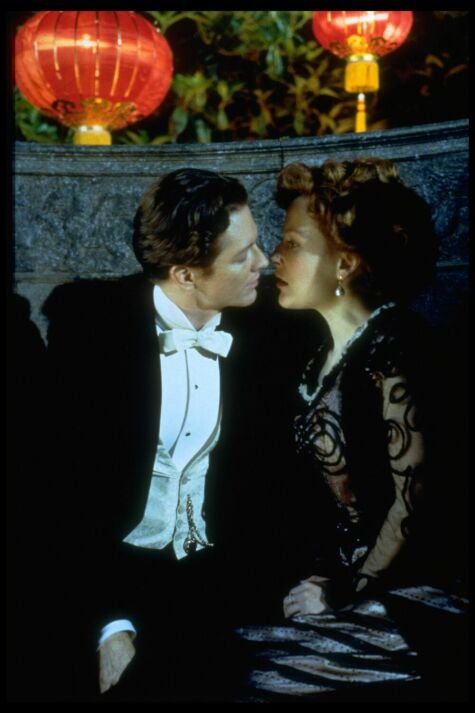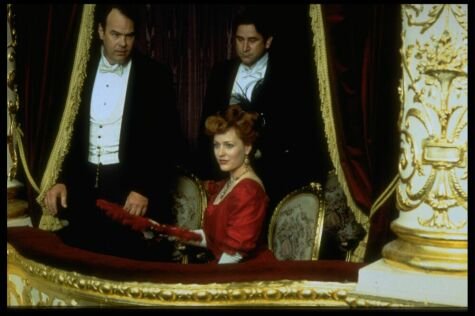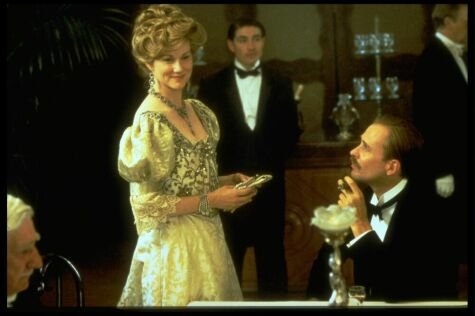As promised, the second in a series, “Professor C.’s Wharton Web Seminars.” In which we discover how literary criticism and flame wars intersect.
Before watching the film of Edith Wharton’s “House of Mirth,” directed by Terence Davies, with Gillian Anderson as Lily Bart and Eric Stolz as Lawrence Selden, I stumbled on an internet war. What follows is a much shortened version.
“mikeeoo”: This is my favorite of all the Wharton novels adapted for the screen…Absolutely true to the novel.
“rdconger”: The film and the performances were ALL abominable.
“americansykho”: Oh my. Have you ever read The House of Mirth? … I’m French and I studied literature… you definitely can’t say that “it is a transparent rip-off of Madame Bovary.”
“rdconger”: The fact that you thought the weak, aimless, and dull performances by Anderson and Stoltz were “especially amazing” tells me that you have absolutely no serious talent for assessing a performance… nor even for discerning what is “amazing” and what is “dreck.” I could point out that I read and speak French as well that I have a Ph.D. in comparative literature – but that doesn’t prove my point.
“theninthgate”: You demonstrated nothing, apart from being a “particularly inept” reader and movie viewer…I think it’s safe to assume that no one would have suspected you of having a Ph.D. in comparative literature.
“rdconger”: Well, we could continue the pissing contest, I guess….I don’t care how many critics liked this unimportant film…You make the logical error of appealing to authority.
“theninthgate”: Next time you decide to ramble about “an unimportant movie,” do your homework…don’t be such an angerball. Unless your idea of not behaving like a herd animal is to make an ass of yourself.
“rdconger”: All you can do is attack me personally, and you cannot, and do not, refute a thing I’ve said.
“theninthgate”: Relax, take a chill pill, go for a walk or something.
“rdconger”: Physician, heal thyself.
“Dracii”: wow you are a bit full of yourself, aren’t you? And you have a Ph.D. wow good for you…Dreck?? You are multi-lingual as well? Bully for you.
“x-phile-1”: I love Gillian Anderson in “The X-Files,” but I’m not blind. She was all wrong as Lily Bart.
I’ve written this without having seen the film. Now it feels like a college test. Do you agree with “rdconger” or “mikeeoo”? Why?
*****************************************************
Having finally watched “The House of Mirth,” I’m (reluctantly) more on the side of “rdconger, Ph.D” than that of “mikeeoo” and others who liked the film. The House of Mirth, as much as The Age of Innocence, is about what goes on beneath the surface of things. “The House of Mirth,” the film, is mostly surface, little depth.
The novel’s first scene is crucial. Lawrence Selden sees Lily Bart standing outside Grand Central Station, having missed her train to Rhinebeck, where she’s to visit the Trenors in their grand (and foolishly named) house, Bellomont. Lily has some time to kill. She and Lawrence Selden are old friends, not lovers, but attracted to each other. Lily is poor and needs a rich husband. Selden is a lawyer, not rich. How to pass the hour or two together? The dialogue between them is a masterpiece of flirtatious indirection and understandings that are never spelled out. “ ‘What luck,’” says Lily, “ ‘how nice of you to come to my rescue.’” What form should the rescue take, asks Selden? “ ‘Oh, almost any-– even to sitting on a bench and talking to me,’” says Lily, stopping herself before saying “anything.” “Anything” turns out, by stages, to be perhaps tea at Sherry’s, or tea in “a quieter place,” then a walk that leads to Selden’s apartment building, and finally, as if by accident, to tea in his apartment — “‘Why not? It’s too tempting – I’ll take the risk,’” says Lily; “Oh, I’m not dangerous,’” says Selden. He assures her, turning the latchkey, “there’s no one here.” Over tea, they talk about Lily’s need to marry.
As she leaves, Lily encounters a charwoman who looks at her askance. She is upset. “What did the creature suppose? Could one never do the simplest, the most harmless thing, without subjecting oneself to some odious conjecture?” Then, outside, she meets Simon Rosedale. “ ‘This is luck,’” he says, echoing Lily’s greeting to Selden. But why is she in town? “‘A little shopping, I suppose?’” Trapped, Lily fibs, “I came up to see my dress-maker. I am just on my way to catch the train to the Trenors.’” A bad mistake. Simon Rosedale owns the building, which he’s named “The Benedick” (“ ‘I believe it’s an old word for bachelors’”); “ ‘I didn’t know there were any dress-makers in the Benedick,’” he says. He offers her a ride to Grand Central: “ ‘You’ve barely time to catch the five-forty. The dress-maker kept you waiting, I suppose.’” Lily turns him down.
The film deals crudely with the minuet that Lily and Selden dance together. Some of the dialogue remains, but it is as if the director doesn’t want to waste time on human divagations and subtleties. “What luck,” says Lily, “how nice of you to come to my rescue. ” “What form should this rescue take,” Selden asks? Lily: “Oh, almost any.” Selden suggests tea at Sherry’s. Lily: “I’m dying for a cup of tea but isn’t there a quieter place? Selden: “I live near here.” Lily: “At the Benedick still?” Selden: “Yes, why don’t you come up?” Lily: “Why not? It’s too tempting – I’ll take the risk.” Nuance and tension are quite lost. Lily already knows that Selden lives at the Benedick. There is no stroll on Madison Avenue that in the novel takes them past the Benedick, where Lily asks, it seems innocently, “Do you live here?” In the novel, the dance between Lily and Selden takes time. In the film, the two of them almost rush to his apartment. And as Lily leaves Selden’s, there’s no charwoman to embarrass her and point the moral of the tale (though she does turn up later at Lily’s door to offer her Bertha Dorset’s incriminating letters to Selden). Rosedale is blunt, not oblique. “Benedick,” he says, “means confirmed bachelor.”
The players, Gillian Anderson and Eric Stolz, are to some extent hampered by their material. The rhythms of the film, in speech and movement, are as regular as a metronome, and neither of the principals manages to rise above these limitations of pace. It feels as if (I’m quoting Christopher Null) they “are reading for a play off-Broadway or in their backyard.” With her pouty lips almost always apart, Anderson emotes in a single key. Stolz doesn’t do much emoting at all until the close when, in a debased version of Wharton’s constrained ending, he weeps over Lily’s dead body. As Newland Archer in “The Age of Innocence,” Daniel Day-Lewis equally avoids emoting but imparts a depth that Stolz cannot manage. Of all the players in “The House of Mirth,” the one who most stirs the blood is Laura Linney, the wicked and lovely Bertha Dorset, whose virtuoso mobility of expression demonstrates, if proof were needed, that one may smile, and smile, and be a villain. Linney is the epitome of smiling vicious. Also convincing is Anthony LaPaglia, with his cool inflections, as Rosedale. Even Anderson achieves a certain frail dignity as Lily spirals downward. But I think it’s not enough.
***************************************************
On the “World Socialist Website” (of all places), “published by the International Committee of the Fourth International,” is a commentary by David Walsh on “The House of Mirth,” comparing it (inevitably) to Scorsese’s “The Age of Innocence.” Walsh thinks Davies’s film “incomparably superior.” Scorsese has a larger budget to underwrite all the sumptuous food and clothing and décor of rich New York, managing “in the process to miss three-quarters of Wharton’s irony and savagery” and ending up with “a flat and ultimately disappointing work.” Like “rdconger, Ph.D.,” I’m tempted to say, “you have absolutely no serious talent for assessing a performance.” Can we have seen the same films? Yes, but with different criteria of value. What Walsh values (notwithstanding his silly claim that Scorsese misses most of Wharton’s irony), and what he finds, is explicit social criticism. Davies “paints a corrupt and remorseless social universe. The work is a devastating indictment.” In a closing scene, as Lily walks to the Dorsets’ house, she passes a street orator, discordant in the narrative and absent in the novel, who tells a cheering crowd in a thick accent: “Here today, I will tell you about the plight of the poor people of Russia under the tsar” — a heavy-handed interpolation. Scorsese’s lavish food and clothing and décor, scorned by Walsh, are a more subtle and telling counterpoint both to social inequality and to the cruelties (Scorsese’s “brutality”) of New York’s social world. Davies and Walsh look in as outsiders and find corruption they knew was there before they started. Davies doesn’t care at all about the ceremonious intricacy of the Lily Bart–Lawrence Selden minuet. Scorsese works from within and allows the viewer to figure it out. The seductive temptations of food and clothing and decor are not easy to resist – even for Martin Scorsese.
Why do aesthetic disagreements become vehement? I borrow from the on-line Stanford Encyclopedia of Philosophy, on Immanuel Kant’s aesthetics: “we think that others ought to share our judgment. That’s why we blame them if they don’t…. The judgment of taste has … an aspiration to universal validity.” That’s why “rdconger” and “theninthgate” and David Walsh and the rest of us get all riled up.
Images: All from iMDB, here.




21 Responses
i’m inclined to agree with you. “house of mirth” is one of my all-time favorite books, and i just don’t think a movie can do the subtleties of the book justice. i don’t think it’s the actors’ or the director’s fault…it’s just not a book that easily translates to film. at least the costumes and sets make for glorious eye candy!
Oh dear! I have not seen the film, but reading your account of the way they gutted the meeting between Lily and Selden, I think I am unlikely to do so.
It interests me that Scorcese chose Age of Innocence and not House of Mirth if what interested him was the brutality of the New York social world. I think of House of Mirth as far more brutal than Age of Innocence.
Wow. I love this post for a variety of reasons, perhaps most for the insight offered by the Stanford Encyclopedia of Philosophy on why we “get all riled up,” it has taken decades to no longer need validation from others on matters of personal taste.
I also appreciate the comments you selected from “rdconger, Ph.D.” and those engaged in the online debate, I always marvel at how quickly the comments become derogatory statement’s on one’s credentials, it is a universal phenomenon.
Thank you for such a thought-provoking post!
tp
we think that others ought to share our judgment
We want them to share our judgment because obviously we believe we are right. To slam one’s opinion of a mediocre movie is getting dangerously close to saying, “You are a moron!” Which is exactly what happened further on in this diagloue. Intellectual arguments do not have a right or a wrong. Oh, people may agree or disagree (and I’ve heard many people say HofM was a mediocre movie and Scorsese’s AofI was fantastic), but, really, it’s not a given. Like say 1+1=2. Plus, I do think that the anonymity of the Internet encourages confrontation, or at least is not as hampered by normal social conventions. I doubt these two would be at each other’s throats if they were standing face to face. They might “think” the other was full of it, but they certain wouldn’t say it.
The House of Mirth is one of my favorite books–in fact, it changed my life nearly 23 years ago now. What the movie misses (as does Scorsese’s equally problematic film) is that while both are all right films, they miss the subtleties of Wharton’s characters and setting and, frankly, the gender issues embedded in both novels. Or, rather, both films reduce the gender issues to simple “bad/good” melodrama. And as reductive as it sounds when I write it, these two male directors pay little attention to the female realities of Wharton’s stories–ergo the giddy-up and go quality of their films doesn’t allow for the nuances of Wharton’s tales–but men generally construct action differently than women, when telling stories. Lovely sets, costumes, food/meals, ceremonies, rituals, and situations should be only the glossy cover to the bare facts of life for women who are complex, independent, poor, with no family, and step outside the boundaries of accepted behavior–but in both films, Wharton’s feminist/humanist morality, rage, and fearless honesty are missing in favor of .
Thank you for this analysis! I think I will skip the film.
I think that entire arguement showed the ignorance and immaturity of both of the commentors. I don’t believe this was an aesthetic disagreement. The root cause of the arguement seemed more about one-upmanship of “qualifications” than it did about the performance.
I saw the door to this arguement open when I read the line, “Oh my. Have you ever read The House of Mirth? … I’m French and I studied literature…”.
That comment insinutated that rdconger had commented without having read the book, and gave him (her?) an “I’m smarter and have more authority on the subject than you” slap on the wrist.
And of course, the rebuttle: “I could point out that I read and speak French as well that I have a Ph.D. in comparative literature”.
The argument that ensued was no more than name calling. It sounded like two kids in a sandbox using ninth grade vocabulary.
None of the arguement (at least that I have read) gave any opinion to support or negate the actual film. Aesthetic differences? I doubt it.
I do believe that there are some people who feel the need to validate themselves, whether those people realize it or not. Those validations are usually delivered by passive-aggressive statements, as seen in this dialogue.
Thank you for this thought provoking post! I needed a little brain exercise this afternoon!
I watched the film ages ago, I remember thinking at the time it was enjoyable but a bit lightweight, however it did inspire me to buy the book which can only be a good thing. The House of Mirth now ranks amongst one of my favourite novels, a relevant story then and a relevant story now.
Your post has inspired me to reread the book (will remember to have Kleenex on hand) and then watch the film.
Great discussion. I am one to say that Intelligent people can agree to disagree.
I will see the movie. Thank you Professor.
Xoxo
Karena
Art by Karena
ah, thinking that others ought to share our judgment; from the crusades all the way up to the kardashians, has conflict ever been about anything else? i think i’d agree with your take on davies’ version of mirth, though i have a hard time being on a side which includes someone who deploys their phd like rhetorical brass knuckles (rdconger, i’m looking at you). one demonstrates that one is well-educated.
vaguely related: laura linney was a reader at my beloved ex-boss’s wedding this past fall, and we all felt very sorry for the groomsman who had to read after her.
I am reminded by this post of two books that I thoroughly enjoy, one movie that sucks me in with all of its trappings (and isn’t the term “trappings” when applied to the accouterments of wealth in Wharton’s works), and finally of one of my favorite cartoons.
For, indeed, Someone Is Wrong On The Internet.
I loved The House of Mirth – never saw the film and probably won’t.
Ugh, the book was heavy (good but tragic) and like Ethan Frome I’m not sure I can bear to read it again. Custom of the Country wasn’t much cheerier, nor was Age of Innocence though I do love it for its exploration of duty and the human heart (and the ending, when the world has changed so much that boys from the best families are marrying the lovely young daughters of scandal and no one even thinks to harm them…). I love Wharton and am obsessed with her ghost stories. Again, so much of their power is from the underlayers – Afterwards is just great (and talking about layers? Roman Fever….).
Oh, internet wars! They bring so much base reality to an earlier, more carefully depicted base reality. Good to see you here again, Professor C. I haven’t seen the film, so bow to your view. Perhaps one day you could tell us what you make of Nancy Mitford?
Hm, I recently watched this film for the first time, while it has been some time since I read the book. I think there may be very good reason for the superficiality of the film. The subject matter of the story is about surfaces, isn’t it. It may be that the viewer, as in reader-response theory, is obliged to provide the interpretation and to search out the depths.
Thank you Professor C., and to all of you reading and commenting. These posts were highly requested in the reader survey, and I appreciate everyone contributing.
Your quotation from the Kant entry is so apt, particularly considering the trash-talking of credentials that makes up a large part of that rather amusing exchange. I am a refugee from academia, and I don’t miss that aspect of it one bit.
I haven’t seen “House of Mirth” either, but I am generally inclined to regard novels and film adaptations of novels as discrete, separate texts, because the acts of reading and watching are themselves so different. Adapting a novel completely faithfully for the screen so often results in a dull, plodding three-hour saga. Often the best film adaptations are more akin, say, to a theatre director’s decision to set Richard III in an alternate-history fascist England (also done on screen, and great fun) or perform Henry IV, pt. I with an all-female cast. “Apocalypse Now” comes to mind. Or even James Whale’s “Frankenstein,” which bears very little resemblance to Shelley’s novel but is still a masterpiece in its own right.
So if I do see Davies’ film someday, I won’t regard it as the “The House of Mirth” adapted for screen, but as Davies’ interpretation of “The House of Mirth”–or maybe as Davies’ Marxist reading of the novel presented as a film (with the added scene of the Russian agitator as a kind of directorial commentary), rather than a journal article, with which I can choose to agree or disagree. Does that distinction make sense? It has the added benefit of affording me some detachment and protection from disappointment–the director hasn’t “destroyed” the film; it’s simply that I don’t agree with his or her reading of it.
And if it is a great adaptation, as Scorsese’s was, I can still appreciate it as a thing of beauty and a joy forever.
What an interesting post! It’s great to have imput on Edith Wharton by Professor C!
Chez de Ville we’ve been discussing “The House of Mirth” as Madamoiselle de Ville has been studying the book in her American Novel class.
I certainly preferred the book to the film, but at least the film, offered non readers a glimpse into Wharton’s work, as did “The Age of Innocence”. Perhaps, it even inspired a few people to go out and buy the book and read it.
It’s odd how different I view the story today versus what I though 30 plus years ago. In some ways I now see the character of Lily as complicit in her victimization. Today I am less sympathetic and just want to scream at the book “Don’t do it, DON”T DO IT..you’re gonna get screwed!”.
This movie has been one of my favorites since it came out. However, i do have one small issue with it, and its staying true to the plot of the Wharton novel:
I understand things don’t always translate as well from print to film (especially with certain plot points), but i think the movie could have benefited by including the character Gerty Farish into the movie. Instead, the movie combines Grace Stepney’s role with Gerty’s personality. It didn’t ruin the movie for me (i still enjoyed it immensely), but…
I loved House of Mirth (novel) and watched the movie not too long afterwards on youtube in 10 minute installments which is less than ideal however I agree with Prof C, the cast was all wrong. I like GA but she wasn’t the more womanly woman I imagined from the novel who was far more sympathetic. ES as Selden also missed badly as his characters never interest me. I can’t look at Dan Ackroyd w/o expecting him to stuff a salmon in his coat.